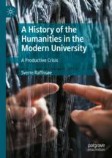Search
Search Results
-
Re-charge: Postcolonial Studies and Energy Humanities
What do postcolonial studies and energy humanities have to say to one another? Given that the former is by now a well-established field and the...
-
An Avoidable Dependency? Russian Gas and German Complacency in the History of East–West Energy Relations
How dependent were Germany and the European Union as a whole on Russian gas, and what lines can be traced in the historical development of energy...
-
A Model for Heterogeneous Energy Transitions
The theory that economic forces and political decisions shape energy transitions fails because it does not recognize that the process of invention...
-
The Division Between the Different Sciences on the Singularly and Emphatically Human and New Branches of Science
The establishment of the Humboldtian university model and the decisive role allotted to the humanities within it permitted an ongoing formation of...
-
Where Do We Go From Here?
The final chapter summarizes the research process described in chapters two through eight and suggests ways to continue learning methods and...
-
Fighting Science with Science: Counter-Expertise Production in Anti-Shale Gas Mobilizations in France and Poland
Between the second half of the 2000s and the first half of the 2010s, the prospect of shale gas extraction in Europe at first prompted fervent...

-
A New Methodology: The Quadruple-Evidence Method
The field of traditional Chinese studies is an academic tradition with its roots in the Confucian classics and the humanities. Its research paradigm...
-
Chapter Nine 1990–2002: Marketization Trends and Involvement in Globalization
The Soviet and East European revolutions of 1989 had a huge impact upon the Chinese Communist Party. Although the June Fourth incident clearly...
-
The Nexus among Water, Soil, Food, Biodiversity and Energy Security
Human well-being, human development and peaceful coexistence require healthy ecosystems and ecosystem services. However, humankind has produced...
-
Unravelling Urban Technonatures
In this introductory chapter, we examine the historiographical development of ‘technonatures’ as an analytical lens to study the dynamic and mutable...
-
Introduction
This volume explores the history of the Long-Term Ecological Research (LTER) Program that began in the U.S. in 1980, with funding from the National...
-
Dealing with Vagueness in Archaeological Discourses
Vagueness is an intriguing topic, especially in the humanities. It has been treated as a problem that contaminates information and makes research...
-
River Lines and Railway Lines: Colonial Military Technonatures in the Making of Sudan’s Capital Region, 1880s–1920s
British colonialists represented Khartoum as a triumph of colonial modernity raised from the ashes of shameful defeat. This story obscured the...
-
Whither Goest Thou? The Present Predicament
This part reflects upon crucial implications of the investigation. What appears is an enduring productive crisis that has spurred not only an ongoing...
-
Don’t Follow the Wind and the Spatiotemporal Confines of the Nuclear Anthropocene: Future Memory and Synchronous Temporality
This chapter examines future memory by taking on a new materialist mnemonic approach to human-made radioactive events and sources to navigate between...
-
A Hel** Hand: Private Evaluation in Scholarly Correspondence
Mutual evaluation can benefit from both loyal benevolence and independent criticism. Scholarly correspondences often contain a broad range of...
-
Conclusion
This concluding chapter does not seek to neatly summarise nor resolve the questions and issues raised throughout the book; rather it proposes to...
-
“What is Dead May Not Die”: Locating Marginalized Concepts Among Ordinary Biologists
Historians and biologists identify the debate between mechanists and vitalists over the nature of life itself with the arguments of Driesch, Loeb,...

-
Memory and Scales: Culture, Institutions and Interaction
In this chapter, I provide a theoretical and methodological outline of what an interscalarinterscalar approach to cultural memorycultural memory...
-
THE 19th CENTURY
Modern coherent disciplines like physics or linguistics were born in the earlier 19th century, as was the idea of science as systematic, ever-ongoing...
